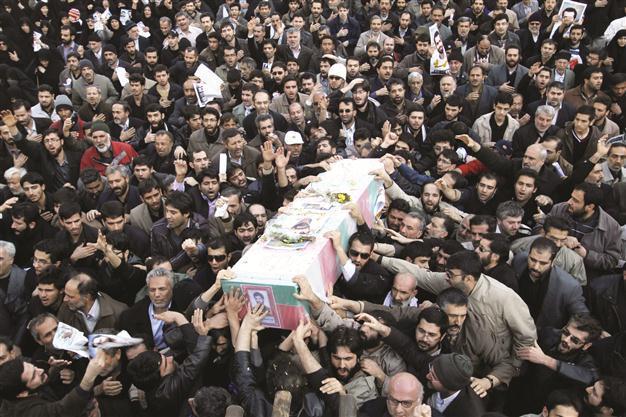Dead scientist’s funeral sees anger at US, Israel
TEHRAN

Iranians carry the flag draped coffin of Mostafa Ahmadi Roshan, a chemistry expert and a director of the Natanz uranium enrichment facility in central Iran, who was killed in a brazen daylight assassination on Jan. 11 in Tehran. Thousands chanted “Death to Israel” and “Death to America” during the funeral of the slain nuclear expert. AP photo
The
Tehran funeral Jan. 13 of a nuclear scientist blown up by a hit man saw the ruling clergy urge Iranians to rally behind it at a forthcoming election and face down Western threats against
Iran’s nuclear program.
In a mood of high emotion in a city increasingly beset by U.S. and European sanctions and fears of war with
Israel and the West, hundreds of chanting mourners carried the flag-draped coffin of Mostafa Ahmadi-Roshan, killed Jan. 11 by a motorcycle assassin in rush-hour traffic.
“Death to America! Death to Israel!” roared the crowd streaming away from weekly prayers at Tehran University, where the dead man was hailed as a martyr in the tradition of Imam Hussein, a revered figure for Iran’s Shiite branch of Islam.
State radio described the 32-year-old chemical engineer, whose driver was also buried Jan. 13, as having worked on procurement for the uranium enrichment plant at Natanz. This disclosure may strengthen suspicions that he was targeted by Israeli and Western agencies, who say some covert Iranian purchases confirm their skepticism of Tehran’s assertion that it is not seeking to develop atom bombs.
Iran’s supreme leader, Ayatollah Ali Khamenei, said the “abominable” and “cowardly” killing was committed “with the planning or support of the intelligence services of the CIA and Mossad” of the United States and Israel. He said in a statement his country would “continue with determination” its nuclear activities, which Western governments suspect mask a drive for a weapons capability despite Tehran’s repeated denials.
Some media close to Iran’s conservatives have called for “retaliation” against Israeli officials. The Iranian government has demanded the U.N. Security Council condemn the “terrorist” killing. The U.S. has strongly denied it had anything to do with the assassination, although Defense Secretary Leon Panetta said: “We have some ideas as to who might be involved.”
The prime suspect is widely seen as Israel, as it was in the murders of three other Iranian scientists in similar circumstances over the past two years. Israel, though, has a policy of not commenting on intelligence matters, although a military spokesman, Brig. Gen. Yoav Mordechai, on his official Facebook page said: “I am definitely not shedding a tear” over Ahmadi Roshan’s killing.
Israeli media also highlighted comments just before the attack by the Israeli chief of General Staff, Lt. Gen. Benny Gantz, who said 2012 would see “things which happen to them [the Iranians] in an unnatural way.” Iran’s government has written a letter demanding U.N. Security Council condemnation of the assassination, which it said was backed by unnamed “foreign quarters.” On whether Israel was involved in the Jan. 11 assassination, President Shimon Peres told CNN Jan. 13, “Not to the best of my knowledge.” U.S. President Barack Obama spoke with Israeli Prime Minister Benjamin Netanyahu the day after the scientist’s murder to discuss developments in Iran.
Iran buries a top scientist Tehran says was killed by Israel and the
US as part of a covert campaign against its nuclear program. Both deny the accusations but a top US official says they have some ideas as to who might have been involved.
